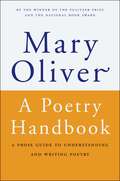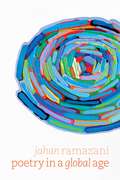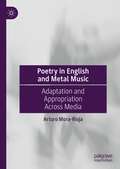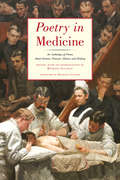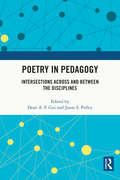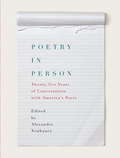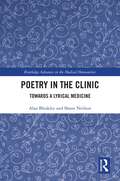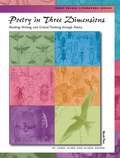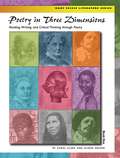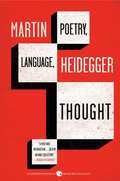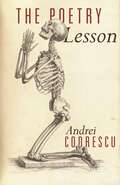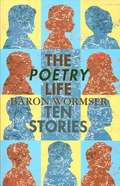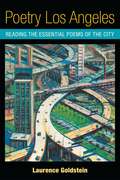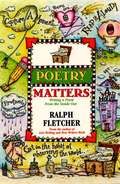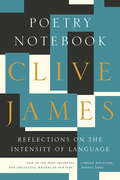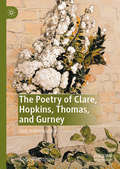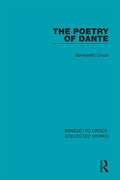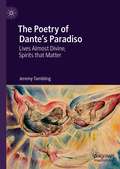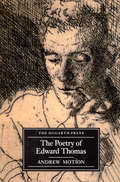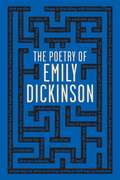- Table View
- List View
A Poetry Handbook: A Prose Guide to Understanding and Writing Poetry
by Mary Oliver“Mary Oliver would probably never admit to anything so grandiose as an effort to connect the conscious mind and the heart (that’s what she says poetry can do), but that is exactly what she accomplishes in this stunning little handbook.”—Los Angeles Times From the beloved and acclaimed poet, an ultimate guide to writing and understanding poetry. With passion and wit, Mary Oliver skillfully imparts expertise from her long, celebrated career as a disguised poet. She walks readers through exactly how a poem is built, from meter and rhyme, to form and diction, to sound and sense, drawing on poems by Robert Frost, Elizabeth Bishop, and others. This handbook is an invaluable glimpse into Oliver’s prolific mind—a must-have for all poetry-lovers.
Poetry in a Global Age
by Jahan RamazaniIdeas, culture, and capital flow across national borders with unprecedented speed, but we tend not to think of poems as taking part in globalization. Jahan Ramazani shows that poetry has much to contribute to understanding literature in an extra-national frame. Indeed, the globality of poetry, he argues, stands to energize the transnational turn in the humanities. Poetry in a Global Age builds on Ramazani’s award-winning A Transnational Poetics, a book that had a catalytic effect on literary studies. Ramazani broadens his lens to discuss modern and contemporary poems not only in relation to world literature, war, and questions of orientalism but also in light of current debates over ecocriticism, translation studies, tourism, and cultural geography. He offers brilliant readings of postcolonial poets like Agha Shahid Ali, Lorna Goodison, and Daljit Nagra, as well as canonical modernists such as W. B. Yeats, Wallace Stevens, T. S. Eliot, and Marianne Moore. Ramazani shows that even when poetry seems locally rooted, its long memory of forms and words, its connections across centuries, continents, and languages, make it a powerful imaginative resource for a global age. This book makes a strong case for poetry in the future development of world literature and global studies.
Poetry in a Global Age
by Jahan RamazaniIdeas, culture, and capital flow across national borders with unprecedented speed, but we tend not to think of poems as taking part in globalization. Jahan Ramazani shows that poetry has much to contribute to understanding literature in an extra-national frame. Indeed, the globality of poetry, he argues, stands to energize the transnational turn in the humanities. Poetry in a Global Age builds on Ramazani’s award-winning A Transnational Poetics, a book that had a catalytic effect on literary studies. Ramazani broadens his lens to discuss modern and contemporary poems not only in relation to world literature, war, and questions of orientalism but also in light of current debates over ecocriticism, translation studies, tourism, and cultural geography. He offers brilliant readings of postcolonial poets like Agha Shahid Ali, Lorna Goodison, and Daljit Nagra, as well as canonical modernists such as W. B. Yeats, Wallace Stevens, T. S. Eliot, and Marianne Moore. Ramazani shows that even when poetry seems locally rooted, its long memory of forms and words, its connections across centuries, continents, and languages, make it a powerful imaginative resource for a global age. This book makes a strong case for poetry in the future development of world literature and global studies.
Poetry in a Global Age
by Jahan RamazaniIdeas, culture, and capital flow across national borders with unprecedented speed, but we tend not to think of poems as taking part in globalization. Jahan Ramazani shows that poetry has much to contribute to understanding literature in an extra-national frame. Indeed, the globality of poetry, he argues, stands to energize the transnational turn in the humanities. Poetry in a Global Age builds on Ramazani’s award-winning A Transnational Poetics, a book that had a catalytic effect on literary studies. Ramazani broadens his lens to discuss modern and contemporary poems not only in relation to world literature, war, and questions of orientalism but also in light of current debates over ecocriticism, translation studies, tourism, and cultural geography. He offers brilliant readings of postcolonial poets like Agha Shahid Ali, Lorna Goodison, and Daljit Nagra, as well as canonical modernists such as W. B. Yeats, Wallace Stevens, T. S. Eliot, and Marianne Moore. Ramazani shows that even when poetry seems locally rooted, its long memory of forms and words, its connections across centuries, continents, and languages, make it a powerful imaginative resource for a global age. This book makes a strong case for poetry in the future development of world literature and global studies.
Poetry in English and Metal Music: Adaptation and Appropriation Across Media
by Arturo Mora-RiojaMany metal songs incorporate poetry into their lyrics using a broad array of techniques, both textual and musical. This book develops a novel adaptation, appropriation, and quotation taxonomy that both expands our knowledge of how poetry is used in metal music and is useful for scholars across adaptation studies broadly. The text follows both a quantitative and a qualitative approach. It identifies 384 metal songs by 224 bands with intertextual ties to 146 poems written by fifty-one different poets, with a special focus on Edgar Allan Poe, John Milton's Paradise Lost and the work of WWI's War Poets. This analysis of transformational mechanisms allows poetry to find an afterlife in the form of metal songs and sheds light on both the adaptation and appropriation process and on the semantic shifts occasioned by the recontextualisation of the poems into the metal music culture. Some musicians reuse – and sometimes amplify – old verses related to politics and religion in our present times; others engage in criticism or simple contradiction. In some cases, the bands turn the abstract feelings evoked by the poems into concrete personal experiences. The most adventurous recraft the original verses by changing the point of view of either the poetic voice or the addressed actors, altering the vocaliser of the narrative or the gender of the protagonists. These mechanisms help metal musicians make the poems their own and adjust them to their artistic needs so that the resulting product is consistent with the expectations of the metal music culture.
Poetry in Medicine: An Anthology of Poems About Doctors, Patients, Illness and Healing
by Michael Collier Michael SalcmanInfused with hope, heartbreak, and humor, this book gathers our greatest poets from antiquity to the present, prescribing new perspectives on doctors and patients, remedies and procedures, illness and recovery. A literary elixir, Poetry in Medicine displays the genre's capacity to heal us. For millennia poets have described the ailments of the body and those who treat them. Infused with hope, heartbreak, and unexpected humor, this book gathers diverse poems about our medical experiences--poems about doctors and patients, remedies and procedures, illnesses and convalescence--each one prescribing a unique perspective and new revelations. A literary elixir, Poetry in Medicine showcases not only the breadth of poetry's relationship to medicine, but also the genre's unparalleled capacity to heal us. Contributors include Auden, Baudelaire, Berryman, Blake, Bishop, Boland, Campo, Cavafy, Clampitt, Chaucer, Clifton, Cummings, Dickinson, Donne, Conan Doyle, Eliot, Frost, Gunn, Hall, Hass, Hayden, Hirsch, Heaney, O. W. Holmes, Kooser, Larkin, Longfellow, Lowell, Merrill, Milne, Milton, Nash, Ovid, Pinsky, Plath, Rilke, Shakespeare, Seshardi, Sexton, Stevens, Szymborska, Whitman, Williams, Yeats, et al.
Poetry in Pedagogy: Intersections Across and Between the Disciplines
by Dean A. F. Gui Jason S. PolleyThe essays compiled in Poetry in Pedagogy: Intersections Across and Between the Disciplines offer praxes of poetry that cultivate a community around students, language, and writing, while presenting opportunities to engage with new texts, new textual forms, and new forms of text-mediated learning. The volume considers, combines, and complements multiform poetry within and beyond existing Teaching & Learning paradigms as it traverses Asia, The Atlantic, and Virtual Space. By virtue of its mélange of intersecting trajectories, across and between oceans, genres, disciplines, and sympathies, Poetry in Pedagogy informs interdisciplinary educators and practitioners of creative writing & poetry involved in examining the multiform through international, cross-disciplinary contexts.
Poetry in Person
by Alexander Neubauer"In the fall of 1970, at the New School in Greenwich Village, a new teacher posted a flyer on the wall," begins Alexander Neubauer's introduction to this remarkable book. "It read 'Meet Poets and Poetry, with Pearl London and Guests.'" Few students responded. No one knew Pearl London, the daughter of M. Lincoln Schuster, cofounder of Simon & Schuster. But the seminar's first guests turned out to be John Ashbery, Adrienne Rich, and Robert Creely. Soon W. S. Merwin followed, then Mark Strand and Galway Kinnell.London invited poets to bring their drafts to class, to discuss their work in progress and the details of vision and revision that brought a poem to its final version. From Maxine Kumin in 1973 to Eamon Grennan in 1996, including Amy Clampitt, Marilyn Hacker, Paul Muldoon, Nobel laureate Derek Walcott, and U.S. poet laureates Robert Hass, Robert Pinsky, Louise Glück, and Charles Simic, the book follows an extraordinary range of poets as they create their poems and offers numerous illustrations of the original drafts, which bring their processes to light. With James Merrill, London discusses autobiography and subterfuge; with Galway Kinnell, his influential notion that the new nature poem must include the city and not exclude man; with June Jordan, "Poem in Honor of South African Women" and the question of political poetry and its uses. Published here for the first time, the conversations are intimate, funny, irreverent, and deeply revealing. Many of the drafts under discussion--Robert Hass's "Meditation at Lagunitas," Edward Hirsch's "Wild Gratitude," Robert Pinsky's "The Want Bone"--turned into seminal works in the poets' careers.There has never been a gathering like Poetry in Person, which brings us a wealth of understanding and unparalleled access to poets and their drafts, unraveling how a great poem is actually made.From the Hardcover edition.
Poetry in the Clinic: Towards a Lyrical Medicine (Routledge Advances in the Medical Humanities)
by Alan Bleakley Shane NeilsonThis book explores previously unexamined overlaps between the poetic imagination and the medical mind. It shows how appreciation of poetry can help us to engage with medicine in more intense ways based on ‘de-familiarising’ old habits and bringing poetic forms of ‘close reading’ to the clinic. Bleakley and Neilson carry out an extensive critical examination of the well-established practices of narrative medicine to show that non-narrative, lyrical poetry does different kind of work, previously unexamined, such as place eclipsing time. They articulate a groundbreaking ‘lyrical medicine’ that promotes aesthetic, ethical and political practices as well as noting the often-concealed metaphor cache of biomedicine. Demonstrating that ambiguity is a key resource in both poetry and medicine, the authors anatomise poetic and medical practices as forms of extended and situated cognition, grounded in close readings of singular contexts. They illustrate structural correspondences between poetic diction and clinical thinking, such as use of sound and metaphor. This provocative examination of the meaningful overlap between poetic and clinical work is an essential read for researchers and practitioners interested in extending the reach of medical and health humanities, narrative medicine, medical education and English literature.
Poetry in Three Dimensions: Reading Writing and Critical Thinking Through Poetry (Book Two)
by Carol Clark Alison DraperThis book is a collection of works by Americans: African Americans, Asian Americans, European Americans, Hispanic Americans, and Native Americans.
Poetry in Three Dimensions: Reading Writing and Critical Thinking Through Poetry (Book One )
by Carol Clark Alison DraperThis book is a collection of works by Americans: African Americans, Asian Americans, European Americans, Hispanic Americans, and Native Americans.
Poetry, Language, Thought (Harper Perennial Modern Thought Ser.)
by Martin HeideggerPoetry, Language, Thought collects Martin Heidegger's pivotal writings on art, its role in human life and culture, and its relationship to thinking and truth. Essential reading for students and anyone interested in the great philosophers, this book opens up appreciation of Heidegger beyond the study of philosophy to the reaches of poetry and our fundamental relationship to the world. Featuring "The Origin of the Work of Art," a milestone in Heidegger's canon, this enduring volume provides potent, accessible entry to one of the most brilliant thinkers of modern times.
The Poetry Lesson
by Andrei CodrescuA rollicking story of the strangest creative writing class ever—as only Andrei Codrescu could tell it"Intro to Poetry Writing is always like this: a long labor, a breech birth, or, obversely, mining in the dark. You take healthy young Americans used to sunshine (aided sometimes by Xanax and Adderall), you blindfold them and lead them by the hand into a labyrinth made from bones. Then you tell them their assignment: 'Find the Grail. You have a New York minute to get it.' "—The Poetry LessonThe Poetry Lesson is a hilarious account of the first day of a creative writing course taught by a "typical fin-de-siècle salaried beatnik"—one with an antic imagination, an outsized personality and libido, and an endless store of entertaining literary anecdotes, reliable or otherwise. Neither a novel nor a memoir but mimicking aspects of each, The Poetry Lesson is pure Andrei Codrescu: irreverent, unconventional, brilliant, and always funny. Codrescu takes readers into the strange classroom and even stranger mind of a poet and English professor on the eve of retirement as he begins to teach his final semester of Intro to Poetry Writing. As he introduces his students to THE TOOLS OF POETRY (a list that includes a goatskin dream notebook, hypnosis, and cable TV) and THE TEN MUSES OF POETRY (mishearing, misunderstanding, mistranslating . . . ), and assigns each of them a tutelary "Ghost-Companion" poet, the teacher recalls wild tales from his coming of age as a poet in the 1960s and 1970s, even as he speculates about the lives and poetic and sexual potential of his twenty-first-century students. From arguing that Allen Ginsberg wasn't actually gay to telling about the time William Burroughs's funeral procession stopped at McDonald's, The Poetry Lesson is a thoroughly entertaining portrait of an inimitable poet, teacher, and storyteller.
Poetry Los Angeles: Reading The Essential Poems Of The City
by Laurence GoldsteinIs there such a thing as Los Angeles poetry? How do we assess a poem about a city as elusive of identity as Los Angeles? What features do poems about this unique urban landscape of diverse peoples and terrains have in common? Poetry Los Angeles is the first book to gather and analyze poems about sites as different as Hollywood, Santa Monica and Venice beaches, the freeways, downtown, South Central and East L. A. Laurence Goldstein presents original commentary on six decades of poets who have contributed to the iconography and poetics of Los Angeles literature, including Elizabeth Alexander, Jimmy Santiago Baca, Dorothy Barresi, Victoria Chang, Wanda Coleman, Dana Gioia, Joy Harjo, James Harms, Robert Hass, Eloise Klein Healy, Garrett Hongo, Suzanne Lummis, Paul Monette, Harryette Mullen, Carol Muske-Dukes, Frederick Seidel, Gary Soto, Timothy Steele, Diane Wakoski, Derek Walcott, and Charles Harper Webb. Forty poems are reproduced in their entirety. One chapter is devoted to Charles Bukowski, the celebrity face of the city's poetry. Other chapters discuss the ways that poets explore "Interiors" and "Exteriors" throughout the cityscape. Goldstein also provides ample connections to the novels, films, art, and politics of Southern California. In clear prose, Poetry Los Angeles examines the strategies by which poets make significant places meaningful and memorable to readers of every region of the U. S. and elsewhere.
Poetry Matters: Writing a Poem from the Inside Out
by Ralph FletcherFrom the book: Maybe you've heard before that poetry is magic, and it made you roll your eyes, but I believe it's true. Poetry matters. At the most important moments, when everyone else is silent, poetry rises to speak. I wrote this book to help you write poems and to give practical ideas for making your poems sound the way you want them to sound. We're not going to smash poems up into the tiniest pieces. This book is about writing poetry, not analyzing it. I want this book to help you have more wonderful moments in the poetry you write. I want you to feel the power of poetry. It's my hope that through this book you will discover lots of ways to make your poems shine, sing and soar.
Poetry, Modernism, and an Imperfect World
by Sean PryorDiverse modernist poems, far from advertising a capacity to prefigure utopia or save society, understand themselves to be complicit in the unhappiness and injustice of an imperfect or fallen world. Combining analysis of technical devices and aesthetic values with broader accounts of contemporary critical debates, social contexts, and political history, this book offers a formalist argument about how these poems understand themselves and their situation, and a historicist argument about the meanings of their forms. The poetry of the canonical modernists T. S. Eliot, Mina Loy, and Wallace Stevens is placed alongside the poetry of Ford Madox Ford, better known for his novels and his criticism, and the poetry of Joseph Macleod, whose work has been largely forgotten. Focusing on the years from 1914 to 1930, the book offers a new account of a crucial moment in the history of British and American modernism.
Poetry Notebook: Reflections on the Intensity of Language
by Clive James"Clive James is more or less the only living poet who manages to be both entertaining and moving." --Edward Mendelson, Columbia University Clive James is one of our finest critics and best-beloved cultural voices. He is also a prize-winning poet. Since he was first enthralled by the mysterious power of poetry, he has been a dedicated student. In fact, for him, poetry has been nothing less than the occupation of his lifetime, and in this book he presents a distillation of all he's learned about the art form that matters to him most. With his customary wit, delightfully lucid prose style and wide-ranging knowledge, Clive James explains the difference between the innocuous stuff so prevalent today and a real poem: the latter being a work of unity that insists on being heard entire and threatens never to leave the memory. A committed formalist and an astute commentator, James examines the poems and legacies of a panorama of twentieth-century poets, from Hart Crane to Ezra Pound, from Ted Hughes to Anne Sexton. In some cases he includes second readings or rereadings from later in life--just to be sure he wasn't wrong the first time! Whether demanding that poetry must be heard beyond the world of poetry or opining on his five favorite poets (Yeats, Frost, Auden, Wilbur, and Larkin), James captures the whole truth of life's transience in this unforgettably eloquent book on how to read and appreciate modern poetry.
Poetry of Attention in the Eighteenth Century
by Margaret KoehlerBy identifying a pervasive cultivation of attention as a perceptual and cognitive state in eighteenth-century poetry, this book explores overt themes of attention and demonstrate techniques of readerly attention.
The Poetry of Clare, Hopkins, Thomas, and Gurney: Lyric Individualism
by Andrew HodgsonThis book attends to four poets – John Clare, Gerard Manley Hopkins, Edward Thomas, and Ivor Gurney – whose poems are remarkable for their personal directness and distinctiveness. It shows how their writing conveys a potently individual quality of feeling, perception, and experience: each poet responds with unusual commitment to the Romantic idea of art as personal expression. The book looks closely at the vitality and intricacy of the poets’ language, the personal candour of their subject matter, and their sense, obdurate but persuasive, of their own strangeness. As it traces the tact and imagination with which each of the four writers realises the possibilities of individualism in lyric, it affirms the vibrancy of their contributions to nineteenth and twentieth-century poetry.
The Poetry of Dante (Collected Works #4)
by Benedetto CroceOriginally published in 1922 and partly from periodicals this book provides a methodological introduction to the reading of Dante’s The Divine Comedy, with the aim of removing the confusion surrounding much Dantean literature and helping the reader to focus attention on the essential qualities of Dante’s work.
The Poetry of Dante's Paradiso: Lives Almost Divine, Spirits that Matter
by Jeremy TamblingThis book argues that Paradiso – Dante’s vision of Heaven – is not simply affirmative. It posits that Paradiso compensates for disappointment rather than fulfils hopes, and where it moves into joy and vision, this also rationalises the experience of exile and the failure of all Dante’s political hopes. The book highlights and addresses a fundamental problem in reading Dante: the assumption that he writes as a Catholic Christian, which can be off-putting and induces an overly theological and partisan reading in some commentary. Accordingly, the study argues that Dante must be read now in a post-Christian modernity. It discusses Dante's Christianity fully, and takes its details as a source of wonder and beauty which need communicating to a modern reader. Yet, the study also argues that we must read for the alterity of Dante’s world from ours.
Poetry of Earth
by Adrienne AdamsAnimals and nature are the subjects of these classic poems. Each poem was selected especially for children by Adrienne Anderson. Poets include: Alfred Lord Tennyson, Isak Dinesen, Robert Frost, & Edna St. Vincent Millay.
The Poetry Of Edward Thomas
by Andrew MotionWhen Edward Thomas died at Arras in 1917 few people thought of him as a poet. Yet in the two years before his death, after a lifetime writing prose, Thomas wrote some of the most enduring poems of his day: poems of war, nature, friendship, despair and exultation. Andrew Motion's pioneering study of Thomas' life and achievement is scholarly yet utterly absorbing, combining an account of his struggles as a writer with perceptive readings of individual poems.Andrew Motion's books include a biography, The Lamberts, George, Constant and Kil, and several prize-winning collections of poetry, the most recent of which is Love in a Life. He is currently writing the authorized biography of Philip Larkin.
The Poetry of Emily Dickinson (Wordsworth Classics)
by Emily DickinsonThe Poetry of Emily Dickinson is a collection of pieces by 19th-century American poet Emily Dickinson, who insisted that her life of isolation gave her an introspective and deep connection with the world. As a result, her work parallels her life--misunderstood in its time, but full of depth and imagination, and covering such universal themes as nature, art, friendship, love, society, mortality, and more. During Dickinson’s lifetime, only seven of her poems were published, but after her death, her prolific writings were discovered and shared. With this volume, readers can dive into the now widely respected poetry of Emily Dickinson. Lexile code: NP
